Loss of a nucleophile - Study guides, Class notes & Summaries
Looking for the best study guides, study notes and summaries about Loss of a nucleophile? On this page you'll find 38 study documents about Loss of a nucleophile.
Page 3 out of 38 results
Sort by
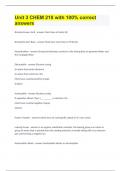
-
Unit 3 :CHEM 210 with 100% correct answers
- Exam (elaborations) • 4 pages • 2023
-
Available in package deal
-
 GUARANTEEDSUCCESS
GUARANTEEDSUCCESS
-
- $13.99
- + learn more
Bronsted-Lowry Acid Must Have a Proton (H) Bronsted-Lowry Base Must have Lone Pairs or Pi Bonds Neutralization Strong Acid donates a proton to the Strong Base to generate Water and the Conjugate Base Electrophile Electron Loving An atom that wants electrons. An atom that is electron rich. Must have a partial positive charge. (Cation) Nucleophile Nucleus Loving If opposites attract, then a _________ is electron rich. Must have a partial negative charge. (An...
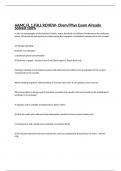
-
AAMC FL 1 FULL REVIEW- Chem/Phys Exam Already Solved 100%
- Exam (elaborations) • 25 pages • 2023
-
 Grademasters
Grademasters
-
- $15.99
- + learn more
In the chromatography of the reaction mixture, water absorbed on cellulose functioned as the stationary phase. What was the principal factor determining the migration of individual components in the sample? A.Hydrogen bonding B.Solute concentration C.Stationary phase concentration D.Thickness of paper - Answer B and D are dumb options. Knock them out. hydrogen bonding to the stationary phase will determine the relative rate of migration of the various components in the sample. When...
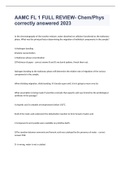
-
AAMC FL 1 FULL REVIEW- Chem/Phys correctly answered 2023
- Exam (elaborations) • 24 pages • 2023
- Available in package deal
-
 Sakayobako30
Sakayobako30
-
- $19.99
- + learn more
AAMC FL 1 FULL REVIEW- Chem/Phys correctly answered 2023In the chromatography of the reaction mixture, water absorbed on cellulose functioned as the stationary phase. What was the principal factor determining the migration of individual components in the sample? A.Hydrogen bonding B.Solute concentration C.Stationary phase concentration D.Thickness of paper - correct answer B and D are dumb options. Knock them out. hydrogen bonding to the stationary phase will determine the relative rat...
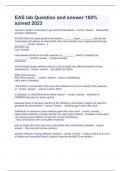
-
EAS lab Question and answer 100% solved 2023
- Exam (elaborations) • 2 pages • 2023
-
Available in package deal
-
 Carzola98
Carzola98
-
- $11.49
- + learn more
EAS lab Question and answer 100% solved 2023common reaction of benzene rings and their derivatives electrophilic aromatic substitution All EAS follow the same general mechanism... ______ steps, _________ acts as the nucleophile and attacks an electrophile, then the aromatic ring is regenerated through ________ 2 aromatic ring loss of proton intermediate formed in the EAS reaction is a _________ which is stabilized by __________ charged species resonance will functional...
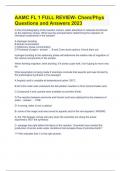
-
AAMC FL 1 FULL REVIEW- Chem/Phys Questions and Answers 2023
- Exam (elaborations) • 17 pages • 2023
-
Available in package deal
-
Dreamer252
-
- $22.49
- + learn more
AAMC FL 1 FULL REVIEW- Chem/Phys Questions and Answers 2023 In the chromatography of the reaction mixture, water absorbed on cellulose functioned as the stationary phase. What was the principal factor determining the migration of individual components in the sample? A.Hydrogen bonding B.Solute concentration C.Stationary phase concentration D.Thickness of paper B and D are dumb options. Knock them out. hydrogen bonding to the stationary phase will determine the relative rate of migrati...
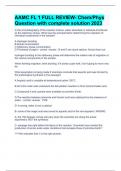
-
AAMC FL 1 FULL REVIEW- Chem/Phys Question with complete solution 2023
- Exam (elaborations) • 17 pages • 2023
-
Available in package deal
-
 Carzola98
Carzola98
-
- $15.49
- + learn more
AAMC FL 1 FULL REVIEW- Chem/Phys Question with complete solution 2023In the chromatography of the reaction mixture, water absorbed on cellulose functioned as the stationary phase. What was the principal factor determining the migration of individual components in the sample? A.Hydrogen bonding B.Solute concentration C.Stationary phase concentration D.Thickness of paper B and D are dumb options. Knock them out. hydrogen bonding to the stationary phase will determine the relative rate of...
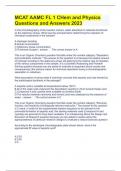
-
MCAT AAMC FL 1 CHem and Physics Questions and Answers 2023
- Exam (elaborations) • 20 pages • 2023
-
Available in package deal
-
Dreamer252
-
- $24.49
- + learn more
MCAT AAMC FL 1 CHem and Physics Questions and Answers 2023 In the chromatography of the reaction mixture, water absorbed on cellulose functioned as the stationary phase. What was the principal factor determining the migration of individual components in the sample? A.Hydrogen bonding B.Solute concentration C.Stationary phase concentration D.Thickness of paper The correct answer is A. This is an Organic Chemistry question that falls under the content category "Separation and purificat...
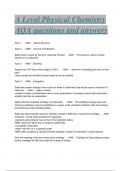
-
A Level Physical Chemistry AQA questions and answers
- Exam (elaborations) • 5 pages • 2024
-
CalebSTUVIA
-
- $8.59
- + learn more
Topic 1 - ANS~ Atomic Structure Topic 2 - ANS~ Amount of Substance State what is meant by the term molecular formula. - ANS~ the actual no. atoms of each element in a compound Topic 3 - ANS~ Bonding Explain why CF4 has a bond angle of 109.5°. - ANS~ -there are 4 bonding pairs and no lone pairs -repel equally and therefore spread apart as far as possible Topic 4 - ANS~ Energetics State and explain change in the volume of water in calorimetry that ...
MCAT 101 EXAM 2 STUDY GUIDE 1. Explanation: This is an Analogy question. A: No. ...
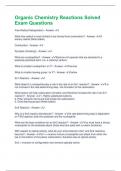
-
Organic Chemistry Reactions Solved Exam Questions
- Exam (elaborations) • 10 pages • 2025
-
 ukangangi
ukangangi
-
- $11.79
- + learn more
Organic Chemistry Reactions Solved Exam Questions Free Radical Halogenation - Answer - What free radical is most is likely to be formed from bromination? - Answer -A tertiary radical (Most stable) Combustion - Answer - Pyrolysis (Cracking) - Answer - What are nucleophiles? - Answer -Electron-rich species that are attracted to a positively polarized atom (i.e. a carbonyl carbon) What is a better nucleophile I or F? - Answer -Flourine What is a better leaving group I or F? - A...

That summary you just bought made someone very happy. Also get paid weekly? Sell your study resources on Stuvia! Discover all about earning on Stuvia



